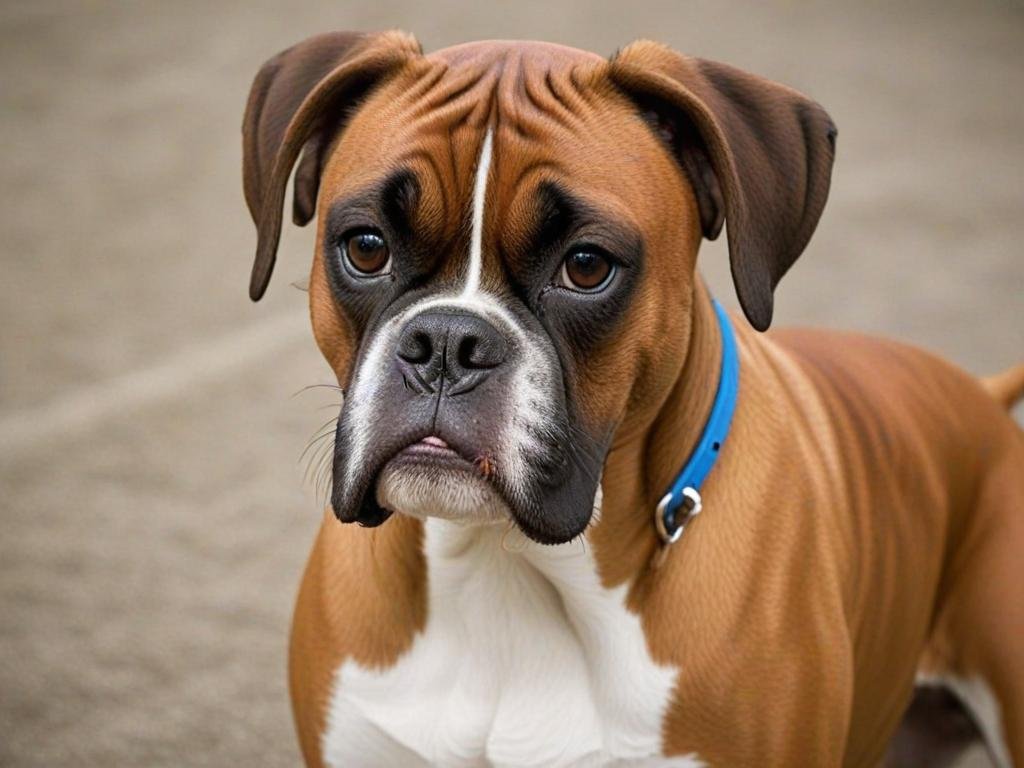The Boxer is a medium to large-sized breed known for its strong, muscular build and boundless energy. This article will delve into the characteristics, origin, lifestyle, personality, lifespan, interesting facts, grooming needs, food habits, and care guidelines for the Boxer dog.
If you need vet appointment through us, please scroll to the bottom and fill up the form!
Characteristics
Boxers are easily recognizable by their broad, muscular bodies, square muzzles, and expressive faces. They have a short, smooth coat that typically comes in fawn, brindle, or white, often with white markings. Male Boxers stand between 22.5 to 25 inches tall and weigh around 65 to 80 pounds, while females are slightly smaller, standing 21 to 23.5 inches tall and weighing 50 to 65 pounds.
Origin
The Boxer breed originated in Germany in the late 19th century. They were developed from the now-extinct Bullenbeisser and the English Bulldog. Initially bred for hunting large game and bull-baiting, Boxers have evolved into versatile working dogs and beloved family pets. The breed gained popularity in the United States and other parts of the world in the 20th century.
Lifestyle
Boxers are energetic and active dogs that thrive in environments where they can participate in various physical activities. They require plenty of exercise, including daily walks, play sessions, and mental stimulation. Boxers excel in canine sports such as agility, obedience, and even search and rescue. They adapt well to living in houses with yards but can also live in apartments if their exercise needs are met.
Personality
Boxers are known for their playful, affectionate, and loyal nature. They form strong bonds with their families and are particularly good with children, making them excellent family pets. Boxers are intelligent and eager to please, which makes them relatively easy to train. They are also known for their protective instincts and will act as devoted guardians of their home and loved ones.
Lifespan
The average lifespan of a Boxer is around 10 to 12 years. With proper care, regular veterinary check-ups, and a healthy lifestyle, some Boxers can live even longer.
Interesting Facts
- Working Dogs: Boxers have served in various roles, including as police dogs, military dogs, and guide dogs for the visually impaired.
- Clownish Behavior: Boxers are known for their playful and clownish antics, which can provide endless entertainment for their families.
- Droolers: Due to their short muzzles and loose jowls, Boxers are prone to drooling, especially after eating or drinking.
Grooming
Boxers have low grooming needs due to their short coats. Regular brushing, about once a week, helps remove loose hair and keep their coat healthy. Boxers are generally clean dogs, but they may require occasional baths, especially if they get into something dirty. Regular ear cleaning, nail trimming, and dental care are also important parts of their grooming routine.
Food Habits and Preferences
Boxers should be fed a balanced diet that meets their nutritional needs based on their age, size, and activity level. High-quality commercial dog food is typically sufficient, but some owners may choose to supplement with fresh vegetables, lean meats, and grains. Boxers are prone to food allergies, so it is essential to monitor their diet and consult a veterinarian if any adverse reactions occur. Fresh water should always be available.
Guidelines for Care
- Exercise: Ensure your Boxer gets plenty of physical activity through daily walks, playtime, and engaging in activities such as agility or obedience training.
- Training: Use positive reinforcement techniques for training. Boxers are intelligent and respond well to consistent, reward-based training methods.
- Socialization: Expose your Boxer to various environments, people, and other animals from a young age to promote good behavior and reduce anxiety.
- Health Check-ups: Regular veterinary visits are essential to monitor their health, keep up with vaccinations, and prevent common health issues such as hip dysplasia, heart conditions, and allergies.
- Grooming: Regular brushing and occasional baths will keep your Boxer’s coat healthy. Pay attention to ear cleaning, nail trimming, and dental care.
- Diet: Provide a balanced diet with appropriate portions to prevent obesity. Monitor their weight and adjust their diet as needed.
In conclusion, Boxers are energetic, affectionate, and loyal companions that can bring joy and protection to any household. With proper care, training, and attention, they make wonderful family pets and dedicated working dogs.

